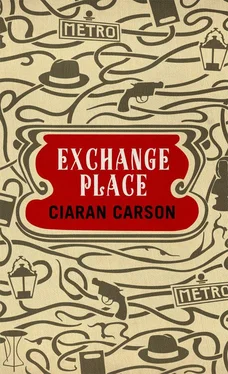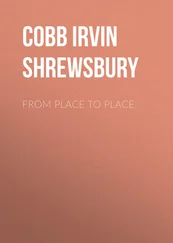But what brings you here, specifically, said Gordon, Hôtel Nevers? I don’t think you got that far in your story. Yesterday in the James Joyce, said Kilpatrick, I met a man with a black briefcase. Before Kilpatrick could name the man in question, Gordon said, Freddy Gabriel, and he asked you along to the Modiano do. Of course you know Freddy Gabriel’s a spy, said Gordon. Nice Oxford don-type spy, but still a spy, at least in a manner of speaking. Everyone knows he’s a spy. For all we know he might be letting us know. Part of his game. That briefcase of his, for instance, hidden camera, mike. You can buy them online, for Chrissake. Everyone can be their own James Bond these days. Or think it. But as we know, it’s not about the information. It’s how you use it. Or what you think it is. What you think it’s worth. It’s about the deal. There’s always something under the table. You have to ask yourself how well you know who’s sitting on the other side. If they are who they say they are, or who they represent. There’s always doubletalk. You watch the body language. They hide their hands under the table, usually they’re hiding something. But then they might want you to think that. And then we have to ask ourselves who we are, and who or what we represent. Funny the way I took you for John Bourne. Some say his real name is Harland, but somehow I can’t see him as a Harland. Much too practical, if you think of Harland & Wolff. And he laughed. Kilpatrick thought of asking if this Bourne might be the Bourne he knew, and as Gordon talked Kilpatrick was beginning to rehearse the story he might tell Gordon, but he thought better of it, and bade his time.
I guess I took you for him because of the clothes, said Gordon. Did you know that in the diplomatic service they train you to look at clothes? Le style, c’est l’homme , that sort of thing. Part of the cultural discourse. No, Bourne dresses like you. Or you like him. Dapper. The sort of man who thinks about textures and colours. And John Bourne has an uncanny feeling for such things, considering he’s blind. Blind? said Kilpatrick. He tried to see the Bourne he knew gone blind. Yes, what is it, diabetic retinopathy? said Gordon. One of those things they diagnose when it’s too late. You have diabetes, the blood vessels at the back of the eye start to leak. Anyway, Bourne can take a piece of material between finger and thumb, gauge the weight, the fabric, the colour even. Says his sense of touch has improved dramatically since he lost his sight. And he’s become more intimately acquainted with the cut of clothes, he says. He can run his hand over a suit and tell to within a fraction whether it will fit. And then there’s his painting. Painting? said Kilpatrick. Yes, said Gordon, Bourne paints. He was a painter before he went blind, and when he went blind he was in despair, I believe, but something made him get back into it again. Honestly, if you saw his work you wouldn’t believe it was done by a blind man. I met him through Freddy Gabriel, of course, Freddy has a way of finding these characters, all part of his network. I think he thinks Bourne has some kind of extrasensory perception, sees things the normal person can’t see, which makes him a good candidate for spy-work. You should talk to Freddy about him. Un autre Ricard ? Kilpatrick nodded.
As Gordon went up to the bar Kilpatrick remembered Bourne talking about portraiture. What do we know of ourselves? he would say. Or of anything? Conscious perception is only a fraction of what we know through our senses. By far the greater part we get through subliminal perception. When I paint a face, am I painting the person I see before me, or the person I have in mind from all those times of seeing him before? Am I painting a figment of a figment? What do we remember of ourselves? A few fleeting fragments, which we make into shifting histories of ourselves. A kind of interior monologue. Sometimes we dramatize ourselves in the third-person. You know George Orwell’s essay, ‘Why I Write’? He describes how from early adolescence he made up a continuous story about himself, a kind of diary existing only in his mind. For minutes at a time, says Orwell, this kind of thing would be running through his head: He pushed the door open and entered the room. A yellow beam of sunlight, filtering through the muslin curtains, slanted on to the table, where a matchbox, half-open, lay beside the ink-pot. He moved across to the window. Down in the street a tortoiseshell cat was chasing a dead leaf … and so on and so forth. I like the detail about the tortoiseshell cat, said Bourne. But anyway, the point is, through language we make up a fictive self, we project it back into the past, and forward into the future, and even beyond the grave. But the self we imagine surviving death is a phantom even in life. A ghost in the brain. As for painting what’s before my eyes, said Bourne, sometimes I like to shut my eyes and let the brush take over.
Kilpatrick knew the Orwell essay, an apologia for his political writing. In a peaceful age, said Orwell, he might have written ornate or merely descriptive books; as it was, after five years serving in Burma as an officer of the Indian Imperial Police, a profession to which he was entirely unsuited, he was moved to write out of a sense of political injustice. Then came the Spanish Civil War. And yet, said Orwell, he never wanted to abandon the world-view he acquired in childhood. So long as he remained alive and well, he would continue to feel strongly about prose style, to love the surface of the earth, and to take pleasure in solid objects and scraps of useless information.
Gordon came back with the drinks. Kilpatrick and Gordon poured the water into the Ricard and watched it go cloudy.
I’d forgotten my drugs. Medication that is. Some years ago, not too long after Harland disappeared, I had been diagnosed with high blood pressure. Subsequently I underwent an echocardiogram, familiarly referred to as an ECHO among the medical profession. In this procedure the patient is asked to undress to the waist and lie on the couch. An ultrasound probe is placed on the chest; lubricating jelly is placed on the chest so that the probe makes good contact with the skin. The probe is connected by a wire to the ultrasound machine and monitor. Pulses of ultrasound are sent from the probe through the skin towards the heart. The ultrasound waves then echo from the heart and various structures in the heart. I sat in the waiting area until the nurse called my name, John Kilfeather, and I went into the ECHO room.
As I lay on the couch I could see the sonogram of my heart on the monitor. It looked like a video of an alien planet, fuzzy with static, its chambers like continents expanding and contracting in time-lapse tectonic shifts; I could hear its movements, a coarse-grained rhythmic swash and back-swash as if of surf purling and collapsing on those alien shores, gathering itself for onslaught after exhausted onslaught; and I thought of how little we know of what goes on within ourselves, what phantoms wander the uncharted regions of the brain, unknown to ourselves. The ECHO showed I had stenosis, or narrowing, of the mitral valve which connects the left atrium and the left ventricle of the heart. I was prescribed a regime of drugs to lower blood pressure and increase blood flow. These included clopidogrel, atoravastatin, bisoprolol, amlopodine and perindopril, words that I have difficulty remembering. But I have the packets bearing the names before me now, having retrieved them from my home.
Home is where the heart is, they say. When I got off the bus at Elsinore Gardens the street was still sealed by white security tape and manned by a police officer. I explained my case to him; after pondering it, he held up the tape to let me through. Five minutes, sir, he said. As I stooped under the tape I heard the tap of a cane and out of the corner of my eye I saw the blind man coming down the Antrim Road, dressed in his familiar nondescript anorak, his long white cane swinging metronomically from side to side like the antenna of a mine-detector, and I thought how the white security tape had made a blind alley of the street where I lived. I walked towards my house, my home, feeling like one who has been away for so long a time that he has become a stranger. It was an eerie feeling to turn the key in the lock and enter the hallway, knowing that I had but a brief temporary access to the house where I had lived all my life, that soon I would be homeless again. Though I was in the house, it seemed haunted by my absence.
Читать дальше












